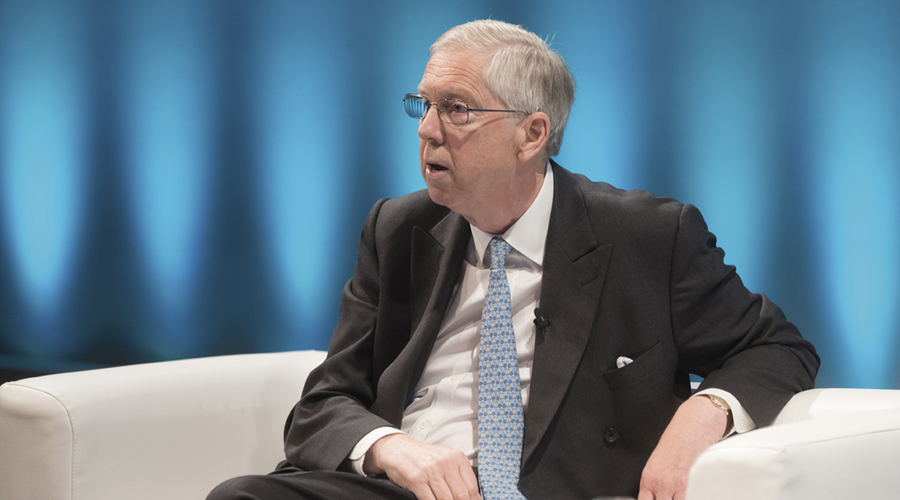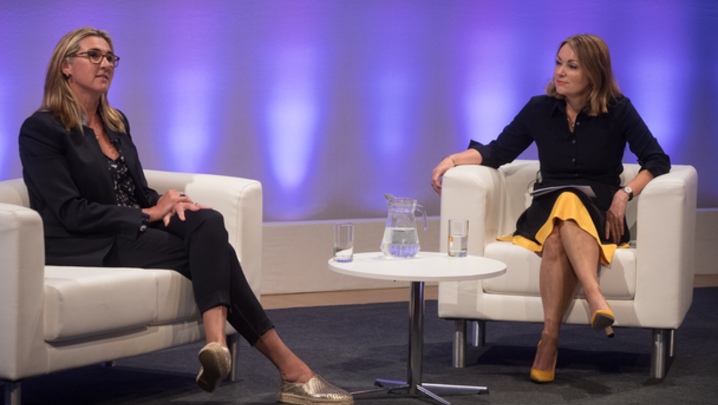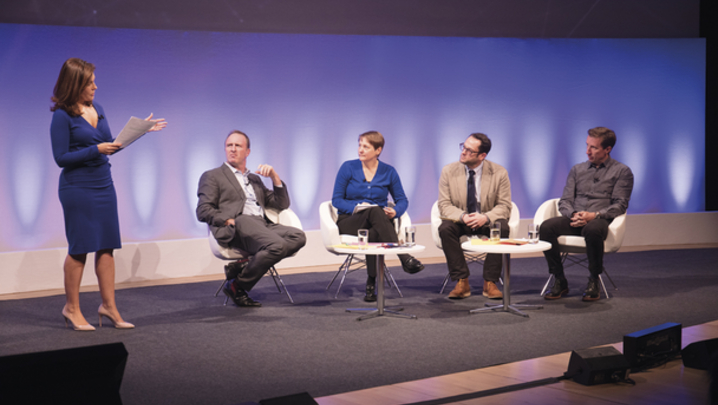BBC Chairman Sir David Clementi lays out his vision for the corporation – and defends its journalists from harassment
A couple of years ago, in his MacTaggart lecture, Armando Iannucci called public service broadcasting “one of the best things we’ve ever done” as a country. It’s something I have always believed. And I believe that the British public does as well.
The BBC always features right at the top of those lists that often appear in the papers of the things that make us feel most proud to be British.
I remember reading one of those not long ago. You know you occupy a special place in the nation’s heart when you’re right up there between Shakespeare and fish and chips.
But I also noticed that Doctor Who, Match of the Day, and the Proms all featured highly in the top 50. As a Strictly fan, it’s surely only a matter of time before it joins the list!
Even though the BBC can bring the country together for big TV moments and national events, we know that all audiences – and particularly younger audiences – are increasingly consuming media in different ways and via an ever-growing number of platforms.
Thanks to the revised governance arrangements under the new Charter, we now have one unitary board.
The fundamental responsibility of the board is to uphold and protect the independence of the BBC.
We are also responsible for acting in the public interest and for meeting the five public purposes that are set out in our new Charter.
Upholding our first public purpose – to provide impartial, accurate news and information – is right at the heart of the BBC.
Truth and accuracy are under assault like never before. I believe that the BBC’s historic role as a trusted guide, the place people come to when they want to find out what is really happening at home and around the world, has never been more vital.
Truth and accuracy are under assault like never before
But today we recognise that it is not enough to wait for audiences to come to us. We need to make sure we go to them, wherever they are.
In an environment in which it is becoming all too easy to choose services that only provide news that reinforces our own opinions, part of the BBC’s job is to work even harder to promote understanding of alternative points of view.
And it is no surprise that alternative or contrary views expressed on the BBC may well grate to a larger extent than they once did. Questions about government policies, which seem to some parts of our audience natural questions to ask, are regarded by others as impertinent and disrespectful.
But holding those in power – or seeking power – to account, asking them what sound bites actually mean, is a key part of our job. It is the responsibility of our journalists to ask the question – even if it is direct, awkward or unwelcome.
Speaking to our journalists, I have become increasingly aware of the abuse that some of them – particularly female journalists – are subject to, on an almost daily basis.
We must support our journalists and call out the abuse they are receiving. It is increasingly explicit and aggressive. And much of it occurs online.
But some of it also occurs in plain sight, at press conferences and political gatherings on all sides. Politicians cannot stand by and watch – they must confront any abuse, and make it clear that it is intolerable.
The second public purpose is to support learning for people of all ages.
One of the BBC’s biggest strengths is its ability to make programmes that can inform, educate and entertain all at the same time. Planet Earth II, for example, was the most requested programme on iPlayer last year.
But, of course, formal learning is also a major focus of our education mission. BBC Bitesize is already used by approaching half of primary school students each term, and an incredible 80% of those in secondary school – more than half of whom say it has helped them achieve better grades.
There are areas, however, in which we need to do more to fulfil our mission. Doing more to support literacy for pre-school children, for example, or lifelong learning for adults. I would like to see the BBC do more in these areas, and I expect us to announce more later in the year.
Our third public purpose is to make the most creative, high-quality and distinctive output.
I thought about this as I watched a BBC drama that was broadcast in May and which I thought was outstanding: Three Girls.
I’m proud that Three Girls was made by BBC Studios. And I believe Studios is going to be fundamental to fulfilling our third public purpose in the years ahead. Under the new Charter, Studios is free to compete directly with other production companies, including seeking commissions from other broadcasters.
It was an inherent part of this Charter arrangement that the competition should proceed on as level a playing field as possible, with Studios not being subsidised by the public service activities of the BBC – and for existing BBC Studios commissions to be open to a contestability regime.
As part of the level playing field, it was agreed that Studios – like other production companies – would not be required to disclose the pay of those who worked for it.
So this exemption is not – as some have described it – an inadvertent loophole… it is an integral part of the competition arrangements and is, so far as the BBC Board is concerned, an important point of principle.
We have started to build a strong professional relationship with Ofcom, built around respect for each other’s duties. I look forward to the publication of the final operating licence, which is an important part of how the BBC is held to account.
In principle, we should want a broadcaster’s performance to be judged by assessing outcomes and impacts for audiences, rather than by prescribing inputs.
In particular, I am concerned about quotas that relate to hours of broadcasting, since the driver here is around quantity not quality. Quotas relating to resource, and in particular to financial spend, are likely to be better drivers towards distinctiveness, although even they can never be guarantors of desired outcomes.
Our fourth public purpose is to reflect, represent and serve the diverse communities of all of the UK’s nations and regions.
Earlier this year, the BBC announced its biggest investment in Scotland, Wales and Northern Ireland for decades. But, when it comes to making sure that we reflect and serve all our audiences, diversity in our workforce is a major priority. And here we have made good progress.
But we are acutely aware that there is much more to do. Not least on gender. We are confident that, when we publish our own [gender pay] gap in the next few weeks, we will prove to be significantly ahead of the national average. But we also know that the BBC should be the standard bearer.
Politicians… must confront any abuse [of our journalists] and make it clear that it is intolerable
The fifth and final public purpose is to reflect the UK, its culture and values to the world.
Arguably, it is more important than ever at a moment when Britain is seeking to redefine its international identity and reshape its relationship with the world. The World Service has long been central to the BBC’s activities here, broadcasting to around 270 million people in 29 languages.
But the Government, recognising the importance of the World Service to the UK, has now made additional investment funds available. It adds up to the biggest expansion of the World Service since the 1940s.
We take it for granted that we can switch on the TV or radio to get a realistic picture of national and international events. But hundreds of millions across the globe rely on the BBC for this. Worryingly, the Iranian courts have, in recent weeks, stepped up their government’s harassment of Persian Service staff based in the UK by freezing the assets they still hold in Iran. We call for this harassment to stop.
I began by asking how the BBC can safeguard its relevance in the years ahead; how we can ensure that our audiences continue to choose us even in the face of remarkable change.
The answer lies in successfully defending the BBC’s independence, and in meeting – often in new and innovative ways – the five public purposes I have highlighted today.
If we can achieve this – and I believe we can – we will ensure that the BBC remains at the core of British life and stays, along with fish and chips, at the top of those “great British” lists well into our second century.
‘Session Four: Keynote’ was given by Sir David Clementi, Chairman of the BBC. This is an edited version of his speech. He was interviewed by Lorna Tilbian, executive director, Numis Securities, who also chaired discussion from the floor. The producer was Helen Scott.
Click here for the full speech.
Question & answer
Q: Now that you’ve had your feet under the desk for nine months… what were your biggest surprises, both on the upside and downside?
A: I don’t think there is anything that has disappointed me or proved in a sense really difficult, but I am really seized by the challenges that the BBC faces… we have a privileged funding model but the downside is that it’s hard to increase revenues.
Q: With BBC Studios, do you think there’s a tension between the hard commercial reality of grinding out those margins and a truly world-class, creatively excellent product?
A: We are absolutely clear that, under the new Charter, BBC Studios stands on its own two feet… it will have to compete. There may be some tension but it will have to find its way around it.
Q: Diversity is a major issue across most organisations… but what about social mobility? What role does the BBC play in that [and] helping the UK become a fairer society?
A: We’ve started recruiting without having the educational background in the application forms… so the bias that we all know exists in recruitment processes is eliminated as best we can.
Q: You said in January that the BBC Board is bound to look carefully at all the services the BBC provides. Are there areas that could be outsourced?
A: There are. The BBC has outsourced a lot of services and, in one or two services within the HR world, actually, the trend is the other way and [they] could be better done in-house.
Q: Are there any particular areas of the world you’d like to shine a torch?
A: We’re likely to be jammed… but we’ll work very hard to get into North Korea.
Q: Does the BBC intend to pay men less and women more?
A: The law says equal pay; it’s not an aspiration, it’s the law. The BBC actually has a low gender pay gap and, when all the numbers are out, I’m confident that we will be well ahead of the national average. We think, from the ONS, the national average is around 18% and ours is about 10%.
Reporting by Tara Conlan.







